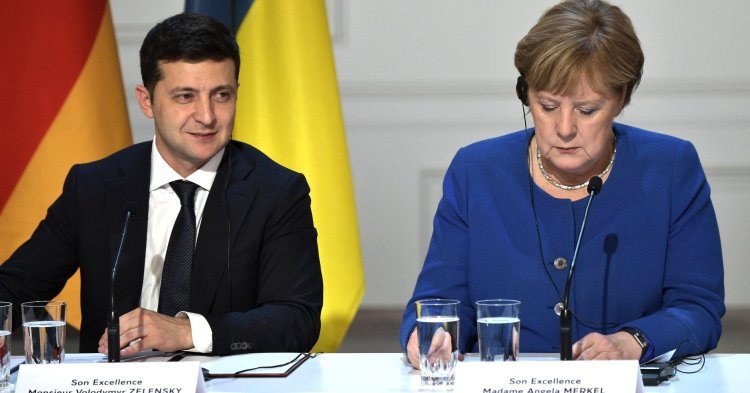What does Germany’s role in the EU mean for Ukraine?
The most common answer to this question for average Ukrainians – whether they are involved in politics or not – would probably be “a lot”. It truly describes the attitude to Germany in general, and a big part of that credibility is owed to Chancellor Angela Merkel personally. Many Ukrainians believe that she was the one who stopped Vladimir Putin from annexing other southern and eastern parts of Ukraine besides Crimea, and prevented him from occupying more Ukrainian territory after he started a war in Donbas.
What Ukrainians understand is that with the world changing and becoming more unstable – especially in Europe – Kyiv will need to make changes to its foreign policy priorities. The time when Ukraine could rely on America as its “big brother” is over, and we need to find a local and strong ally. That ally should be open and ready to help with reforms to change the security sector according to the NATO standards, and to help us live alongside Russia, which still occupies a part of the Ukrainian territory. At least from Kyiv, it seems that Germany could play that role.
Of course, recent political debates in Germany about the succession of Chancellor Merkel have also created some concerns in Kyiv about the future support of Ukraine. Germany is a unique ally, because Merkel is a long-governing leader who is still critically important for diplomatic negotiations.
For example, although the previous French government had played an important role in Minsk Agreements, after Emmanuel Macron’s 2017 victory, it took some time for them to become involved again at the same level. It is important not to waste time – especially given the more than 13,000 Ukrainian lives already lost in Donbas, a number which is unfortunately not getting any smaller. That’s why Ukraine is worried about the transition period that will follow after Chancellor Merkel’s future resignation. One more argument for having Germany as a stable partner is that, although the president of France has changed regularly, the longevity of Angela Merkel has ensured that Ukraine can rely on Berlin for years as a strategic partner.
However, Ukraine hopes to resolve the conflict in Donbas with the involvement of Germany within the Normandy format soon.
How does Germany help Ukraine directly?
There’s no doubt that Ukraine wants to be part of the EU and NATO, and that close ties between Berlin and Kyiv will be beneficial to this goal. Of course, no one will accept Ukraine with the conflict on its territory. On the other hand, Germany could help with the necessary reforms and with implementing EU standards both in domestic Ukrainian legislation and in practical spheres of life. Ideally, Ukraine would eventually be able to make itself into a welfare state at some point, perhaps by taking into account the experience of the EU’s member-states.
Ukrainian think tanks and various NGOs realize that EU membership is not a goal in and of itself, but rather a way to accelerate domestic transformations with the help and guidance from the EU, so as to fit the requirements of being a part of the Euro-Atlantic economic and political sphere.
Bilateral relations were not so intimate before 2014, but then both sides realized the importance of the relationship. A Ukraine Task Force was established at the German Federal Foreign Office and the German-Ukrainian Chamber of Industry and Commerce, as a way of ensuring continuing support. Among other visible acts of support worth mentioning is an adopted Action Plan for Ukraine. According to that plan, Ukraine has received more than 1.4 billion euros for the strategic development of its infrastructure both locally and nationally. What is also important is that a part of these funds were dedicated to the Eastern part of Ukraine that was severely damaged after Russia’s aggression in 2014. Another strategic purpose of these finances is strengthening and expanding capacity on renewable energy sources such as hydropower.
Kyiv expects more attention to Ukraine-Russia relations
Obviously, like other countries, Germany and Ukraine have some tensions. Some of them are critical and important for both sides, while others could be avoided. For instance, the Nord Stream 2 gas pipeline has been a huge apple of discord since 2018. The Ukrainian government doesn’t want to lose an opportunity to transfer Russian gas through its territory. But the purpose of Nord Stream 2 is exactly to exclude Ukraine and deliver the natural gas directly through the Baltic Sea.
The more recent decision by the Parliamentary Assembly of the Council of Europe (PACE) to restore the full membership privileges of the Russian Federation was supported by Germany, but met with great opposition from all Ukrainian political parties. When Germany voted in favor of the return, that was considered to be a betrayal, or even playing on the Russian side.
Domestically, Ukrainians typically see Germans as very pedantic and always punctual, but it will truly be an accomplishment if Moscow’s actions will face an appropriate and punctual reaction in Berlin. Ukraine can’t stand face to face with what is still one of the largest and most powerful armies in the world.
It seems that after Brexit, Germany will be considered the most powerful state in the EU. And if Berlin is leading the European Union, Ukraine has the chance to get a few victories here and there: a continuation of the sanctions against Russia, and maybe some steps towards peace in Donbas.
Ukraine will benefit if Germany becomes the not-so-secret hegemon of the EU, but Chancellor Merkel does not seem interested in pursuing this vision. And that reluctance will likely remain, given the persisting tensions between Donald Trump’s administration and Angela Merkel’s government. Germany cannot lead the EU if the current state of affairs between the US and Germany continues.
Of course, Donald Trump’s decision to relocate US troops from Germany to Poland adds tensions between Berlin and Washington that Ukraine should try to avoid. President Zelenskiy even asked the United States to join the Normandy negotiations once, but with the recent news, it seems very unlikely to happen. The relocation of American troops from Germany leaves a lot of room for interpretation. Germany feels less secure now in comparison; in the past, US troops played an important role in the security guarantees for Europe. But Ukraine is more comfortable with the arrangement, because it still has just two German banks on its market and will be pleased with more engagement. It is really important to burnish Ukraine’s international image, since obtaining more investment funds for Ukraine depends on its business reputation both inside and outside the country. From a Ukrainian point of view, Kyiv wants to see more European institutions involved in the Ukrainian market so that it can appear more attractive to the world.
To do that, Ukraine still needs strong allies in the EU, and so it is looking forward to German leadership in the EU Council with great optimism.


Follow the comments: |
|
